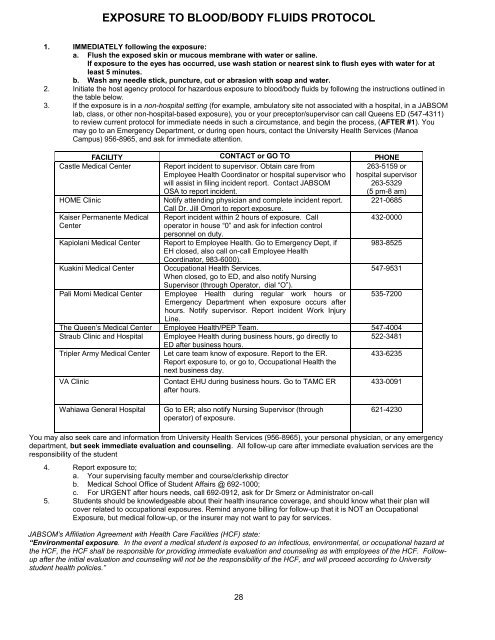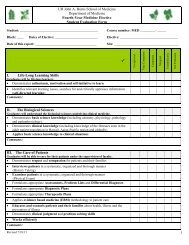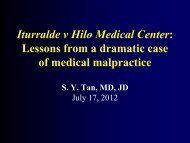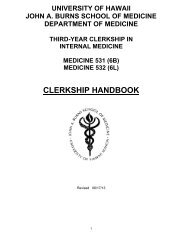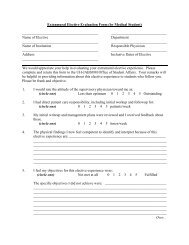clerkship handbook - University of Hawaii â Department of Medicine
clerkship handbook - University of Hawaii â Department of Medicine
clerkship handbook - University of Hawaii â Department of Medicine
You also want an ePaper? Increase the reach of your titles
YUMPU automatically turns print PDFs into web optimized ePapers that Google loves.
EXPOSURE TO BLOOD/BODY FLUIDS PROTOCOL<br />
1. IMMEDIATELY following the exposure:<br />
a. Flush the exposed skin or mucous membrane with water or saline.<br />
If exposure to the eyes has occurred, use wash station or nearest sink to flush eyes with water for at<br />
least 5 minutes.<br />
b. Wash any needle stick, puncture, cut or abrasion with soap and water.<br />
2. Initiate the host agency protocol for hazardous exposure to blood/body fluids by following the instructions outlined in<br />
the table below.<br />
3. If the exposure is in a non-hospital setting (for example, ambulatory site not associated with a hospital, in a JABSOM<br />
lab, class, or other non-hospital-based exposure), you or your preceptor/supervisor can call Queens ED (547-4311)<br />
to review current protocol for immediate needs in such a circumstance, and begin the process, (AFTER #1). You<br />
may go to an Emergency <strong>Department</strong>, or during open hours, contact the <strong>University</strong> Health Services (Manoa<br />
Campus) 956-8965, and ask for immediate attention.<br />
FACILITY CONTACT or GO TO PHONE<br />
Castle Medical Center Report incident to supervisor. Obtain care from<br />
Employee Health Coordinator or hospital supervisor who<br />
will assist in filing incident report. Contact JABSOM<br />
OSA to report incident.<br />
263-5159 or<br />
hospital supervisor<br />
263-5329<br />
(5 pm-8 am)<br />
HOME Clinic<br />
Notify attending physician and complete incident report. 221-0685<br />
Kaiser Permanente Medical<br />
Center<br />
Kapiolani Medical Center<br />
Kuakini Medical Center<br />
Pali Momi Medical Center<br />
Call Dr. Jill Omori to report exposure.<br />
Report incident within 2 hours <strong>of</strong> exposure. Call<br />
operator in house “0” and ask for infection control<br />
personnel on duty.<br />
Report to Employee Health. Go to Emergency Dept, if<br />
EH closed, also call on-call Employee Health<br />
Coordinator, 983-6000).<br />
Occupational Health Services.<br />
When closed, go to ED, and also notify Nursing<br />
Supervisor (through Operator, dial “O”).<br />
Employee Health during regular work hours or<br />
Emergency <strong>Department</strong> when exposure occurs after<br />
hours. Notify supervisor. Report incident Work Injury<br />
Line.<br />
432-0000<br />
983-8525<br />
547-9531<br />
535-7200<br />
The Queen’s Medical Center Employee Health/PEP Team. 547-4004<br />
Straub Clinic and Hospital Employee Health during business hours, go directly to 522-3481<br />
ED after business hours.<br />
Tripler Army Medical Center Let care team know <strong>of</strong> exposure. Report to the ER.<br />
Report exposure to, or go to, Occupational Health the<br />
next business day.<br />
433-6235<br />
VA Clinic<br />
Contact EHU during business hours. Go to TAMC ER<br />
after hours.<br />
433-0091<br />
Wahiawa General Hospital<br />
Go to ER; also notify Nursing Supervisor (through<br />
operator) <strong>of</strong> exposure.<br />
621-4230<br />
You may also seek care and information from <strong>University</strong> Health Services (956-8965), your personal physician, or any emergency<br />
department, but seek immediate evaluation and counseling. All follow-up care after immediate evaluation services are the<br />
responsibility <strong>of</strong> the student<br />
4. Report exposure to;<br />
a. Your supervising faculty member and course/<strong>clerkship</strong> director<br />
b. Medical School Office <strong>of</strong> Student Affairs @ 692-1000;<br />
c. For URGENT after hours needs, call 692-0912, ask for Dr Smerz or Administrator on-call<br />
5. Students should be knowledgeable about their health insurance coverage, and should know what their plan will<br />
cover related to occupational exposures. Remind anyone billing for follow-up that it is NOT an Occupational<br />
Exposure, but medical follow-up, or the insurer may not want to pay for services.<br />
JABSOM’s Affiliation Agreement with Health Care Facilities (HCF) state:<br />
“Environmental exposure. In the event a medical student is exposed to an infectious, environmental, or occupational hazard at<br />
the HCF, the HCF shall be responsible for providing immediate evaluation and counseling as with employees <strong>of</strong> the HCF. Followup<br />
after the initial evaluation and counseling will not be the responsibility <strong>of</strong> the HCF, and will proceed according to <strong>University</strong><br />
student health policies.”<br />
28


